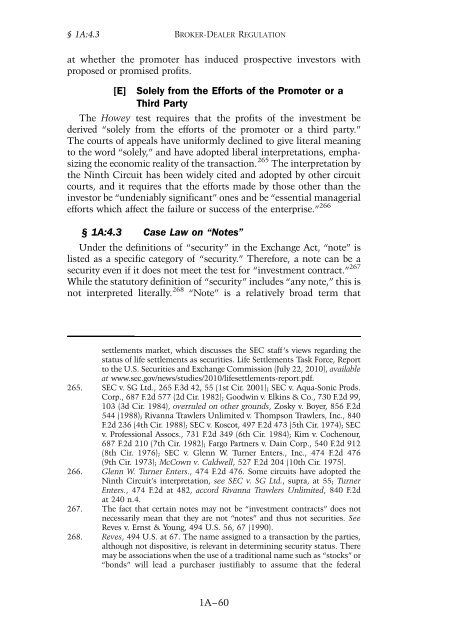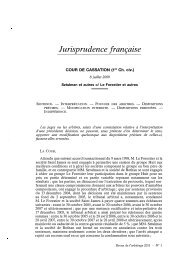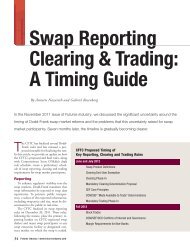What is a Broker-Dealer? - Davis Polk & Wardwell
What is a Broker-Dealer? - Davis Polk & Wardwell
What is a Broker-Dealer? - Davis Polk & Wardwell
Create successful ePaper yourself
Turn your PDF publications into a flip-book with our unique Google optimized e-Paper software.
§ 1A:4.3 BROKER-DEALER REGULATION<br />
at whether the promoter has induced prospective investors with<br />
proposed or prom<strong>is</strong>ed profits.<br />
[E] Solely from the Efforts of the Promoter or a<br />
Third Party<br />
The Howey test requires that the profits of the investment be<br />
derived “solely from the efforts of the promoter or a third party.”<br />
The courts of appeals have uniformly declined to give literal meaning<br />
to the word “solely,” and have adopted liberal interpretations, emphasizing<br />
the economic reality of the transaction. 265 The interpretation by<br />
the Ninth Circuit has been widely cited and adopted by other circuit<br />
courts, and it requires that the efforts made by those other than the<br />
investor be “undeniably significant” ones and be “essential managerial<br />
efforts which affect the failure or success of the enterpr<strong>is</strong>e.” 266<br />
§ 1A:4.3 Case Law on “Notes”<br />
Under the definitions of “security” in the Exchange Act, “note” <strong>is</strong><br />
l<strong>is</strong>ted as a specific category of “security.” Therefore, a note can be a<br />
security even if it does not meet the test for “investment contract.” 267<br />
While the statutory definition of “security” includes “any note,” th<strong>is</strong> <strong>is</strong><br />
not interpreted literally. 268 “Note” <strong>is</strong> a relatively broad term that<br />
settlements market, which d<strong>is</strong>cusses the SEC staff ’s views regarding the<br />
status of life settlements as securities. Life Settlements Task Force, Report<br />
to the U.S. Securities and Exchange Comm<strong>is</strong>sion (July 22, 2010), available<br />
at www.sec.gov/news/studies/2010/lifesettlements-report.pdf.<br />
265. SEC v. SG Ltd., 265 F.3d 42, 55 (1st Cir. 2001); SEC v. Aqua-Sonic Prods.<br />
Corp., 687 F.2d 577 (2d Cir. 1982); Goodwin v. Elkins & Co., 730 F.2d 99,<br />
103 (3d Cir. 1984), overruled on other grounds, Zosky v. Boyer, 856 F.2d<br />
544 (1988); Rivanna Trawlers Unlimited v. Thompson Trawlers, Inc., 840<br />
F.2d 236 (4th Cir. 1988); SEC v. Koscot, 497 F.2d 473 (5th Cir. 1974); SEC<br />
v. Professional Assocs., 731 F.2d 349 (6th Cir. 1984); Kim v. Cochenour,<br />
687 F.2d 210 (7th Cir. 1982); Fargo Partners v. Dain Corp., 540 F.2d 912<br />
(8th Cir. 1976); SEC v. Glenn W. Turner Enters., Inc., 474 F.2d 476<br />
(9th Cir. 1973); McCown v. Caldwell, 527 F.2d 204 (10th Cir. 1975).<br />
266. Glenn W. Turner Enters., 474 F.2d 476. Some circuits have adopted the<br />
Ninth Circuit’s interpretation, see SEC v. SG Ltd., supra, at 55; Turner<br />
Enters., 474 F.2d at 482, accord Rivanna Trawlers Unlimited, 840 F.2d<br />
at 240 n.4.<br />
267. The fact that certain notes may not be “investment contracts” does not<br />
necessarily mean that they are not “notes” and thus not securities. See<br />
Reves v. Ernst & Young, 494 U.S. 56, 67 (1990).<br />
268. Reves, 494 U.S. at 67. The name assigned to a transaction by the parties,<br />
although not d<strong>is</strong>positive, <strong>is</strong> relevant in determining security status. There<br />
may be associations when the use of a traditional name such as “stocks” or<br />
“bonds” will lead a purchaser justifiably to assume that the federal<br />
1A–60





